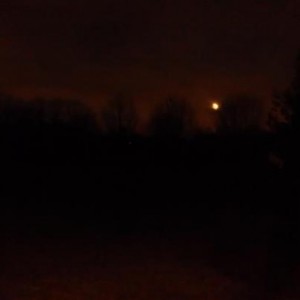We Jews count days starting at night. There was evening and there was morning, the first day. Our holidays all begin in the evening.
But I am a morning person. What can I learn at night? The Hagaddah gives us a clue. It is a usually a portion I am asked to read because people don’t want to trip over the old Hebraic names. “Once Rabbi Eliezer, Rabbi Yehoshua, Rabbi Elazar ben Azariah, Rabbi Akiva, and Rabbi Tarfon dined together [at the Seder] in Bnei Brak. They discussed the Exodus from Egypt throughout the entire night until their students came and told them: “Teachers, the time for reciting the Shema in the morning has arrived.” That would be my husband’s ideal seder, going well beyond midnight. There is so much to learn from the Passover story and all of the questions and their application to modern times. Last night I learned again with a group of women who had gathered to have a women’s seder. What are our unique roles as women? When we walked out we were able to see the full Passover moon.
We learn in Berachot when is the time to say the morning Shema? When you can distinguish between blue and white or even more finely between blue and green or when you can distinguish the face of your friend. Try it sometime, the next time you are burning the candle at both ends. Try saying the morning Shema right before dawn, right at first light.
The seder continues…”Rabbi Elazar ben Azariah said to them: ‘I am like a seventy-year-old man. Nevertheless, I did not merit [to understand the reason for the obligation] to recall the Exodus from Egypt at night until ben Zoma interpreted the verse: “In order that you remember the day you left Egypt all the days of your life.” [The phrase] “the days of your life” refers to the days; [adding the word] “all” includes the nights. The Sages interpreted [the verse]: “the days of your life” refers to the present world; “all the days of your life” indicates the Messianic era.
There is another verse from Holocaust poetry from a wall of a cellar in Cologne that teaches,
I believe in the sun
even when it is not shining
And I believe in love
even when there’s no one there
And I believe in God
even when He is silent
So that is the trick. Remembering that we are loved even when the sun is not shining, even when it is not clear how G-d is present or seems to be silent.
Night can be a scary time. A time when we feel more distant from the Divine. But night can be a time of growth and renewal too. When I am up in the middle of the night wrestling with something, tossing and turning, I remember something that my friend David Ferner, an Episcopal priest says, that it is G-d trying to get my attention in the middle of the night because I was not attentive enough during the day.” Then I usually and curse Dave because I know he’s right.
Today’s mystical interpretation of the 3rd day is Tiferet b’chesed, beauty in lovingkindness. Again we need to look at other translations. Glory, Spirituality, Balance, Integration, and Compassion are all other words I have seen to describe something that doesn’t translate well. If it is balance, then this makes sense, day and night need to balance, darkness and light. If it is glory, then there is a gloriousness of lovingkindness. Oh that we could understand that we are loved even when feeling it not.
On a very sad note, a colleague of mine, Rabbi Robert Freedman, was in a very serious car accident yesterday. A much beloved Hillel rabbi, Rabbi Jim Diamond was killed. They were apparently leaving a study session and someone was going much too fast and hit Bob’s parked car. Psalms says, “Teach us to number our days, that we may gain a heart of wisdom.” I like to think it is about living intentionally and making every day count. Perhaps that is why we count the days of the omer. I hope that Rabbi Diamond’s family finds some comfort in how he made his days count and how many lives he touched.
